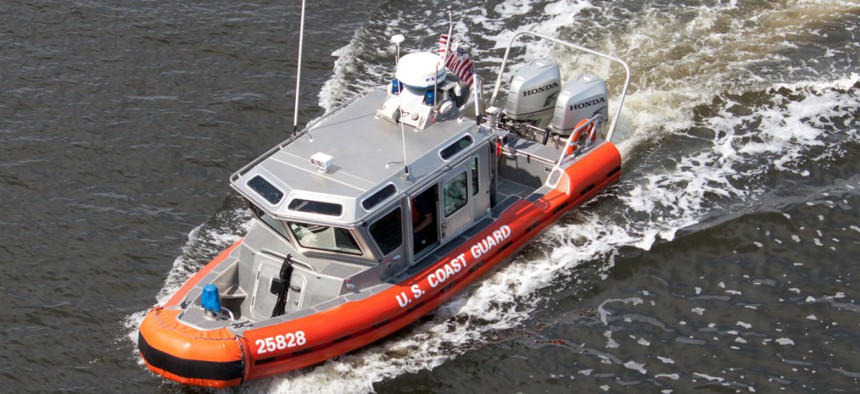
By Rob Wilson / Shutterstock.com
The Coast Guard Isn't Flagging All Employees Who Shouldn't Have Guns
Service members with criminal records not always reported to FBI.
The day after news broke of a Coast Guard lieutenant’s arrest for stockpiling weapons in pursuit of white nationalism, a watchdog faulted the military service for lapses in required reporting of criminal records of employees who are supposed to be barred from firearms possession.
The Homeland Security Department’s acting inspector general cited concerns over data quality in a review prompted by the documented failure of the Air Force to prevent weapons purchases by the eventual shooter in the Sutherland Springs, Texas, church in 2017.
Acting IG John Kelly said Coast Guard field offices need improvement in tracking their own service members’ violations of the Code of Military Justice and reporting them to the FBI through the National Instant Criminal Background Check System.
“We identified 210 service members who committed offenses that made them prohibited individuals,” said auditors summarizing an analysis performed from March-August 2018. “Of these 210, [the] Coast Guard did not enter 16 service members (8 percent) into NICS. This underreporting occurred because Coast Guard policy did not include a requirement to inform the Coast Guard Investigative Service about all individuals referred for trial by general court martial, and because CGIS’s current reporting process does not allow investigators in field offices to have direct access to NICS.”
Coast Guard databases, the report said, “do not track whether a violation or outcome of a case falls under one of the prohibited categories or whether investigators actually followed through on reporting prohibited individuals to the FBI. Second,” it continued, “Coast Guard’s Law Manager database, in part used to track military justice cases, does not contain complete information, including sentence or verdict information, which hindered our ability to determine whether service members were guilty of a crime that would make them prohibited individuals.”
Responding to new requirements in 2018 to keep investigators informed, the Coast Guard referred five service members to a general court martial, auditors found. Their offenses included “drug use and possession, committing a sexual act without consent, unlawfully touching a service member who was asleep, and making video recordings of private areas without consent and distributing the recordings to other service members.” But the referrals contained incomplete information, the report said.
Alerted to the court martial in one case, the Coast Guard supplied the information to the FBI, and that service member is now prohibited from possessing a firearm.
The central problem analysts cited is the inability of the field offices, unlike their Washington headquarters colleagues, to directly access the background check database.
The IG made eight recommendations to the Coast Guard Investigative Service and the Judge Advocate General for improving internal reporting controls, training and guidance. They included allowing more database sharing among agencies and modifying the Coast Guard’s “off the shelf” software used in its own Field Activity Case Tracking System.
The Coast Guard officials agreed, noting, however, that some violations of the code by service members, such as domestic violence misdemeanors, may not show up in database checks.
They added that time and cost constraints might make the recommended software adjustments difficult. They set a goal of completion by December.
Separately last week, the Coast Guard confirmed the arrest of active-duty Lt. Christopher Paul Hasson, stationed in the Washington headquarters, on illegal weapons and drug charges. But Chief Warrant Officer Barry Lane told media outlets that no further details would be provided because the investigation by the Coast Guard Investigative Service, the FBI and Justice Department is ongoing.







